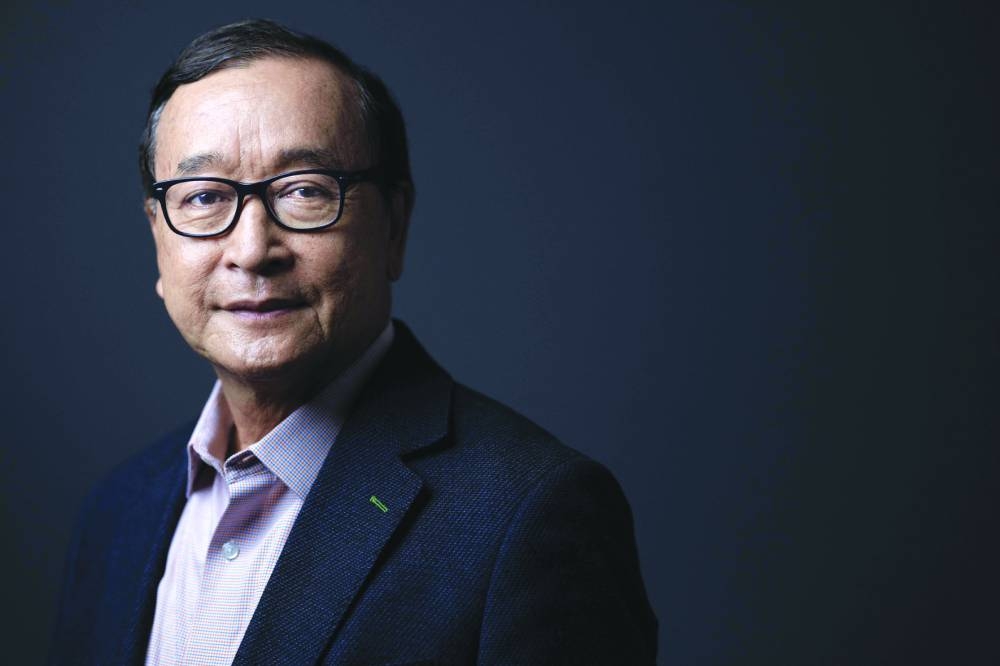Any hopes that Cambodia could become more democratic or friendlier to the West after Prime Minister Hun Sen’s departure are misguided, leading opposition figure Sam Rainsy said.
Hun Sen, one of the world’s longest-serving leaders, declared this week that he would resign and hand over power to his eldest son, Hun Manet, after almost four decades of hardline rule.
The former Khmer Rouge cadre has run the kingdom since 1985, eliminating opposition to his power, with rival parties banned, challengers forced to flee and freedom of expression stifled.
“Some people think that with Hun Manet, Hun Sen’s son, it will be better than with the father, the regime will be better, the Cambodian people will have more freedoms. The new government would be less hostile to the West, would distance itself from China,” Rainsy told AFP in an interview from his exile base in Paris. “I think this is pure illusion.”
Rainsy, who is leader of the Cambodia National Rescue Party (CNRP) and lives in exile in France to avoid charges he says are politically motivated, said that Hun Sen is “preserving the current system” by next month handing the premiership to Hun Manet, a 45-year-old four-star general.
“You can change leaders many times but nothing will change because the system remains the same,” Rainsy said.
Hun Sen’s Cambodian People’s Party (CPP) last week won a landslide victory in an election with no meaningful opposition, paving the way for a dynastic succession to his eldest son that some critics have compared to that of North Korea.
Western powers, including the United States and the European Union, condemned the poll as neither free nor fair.
However, Rainsy said that the Cambodian people’s desire for more democracy remained intact, even after the decades of Hun Sen’s rule.
“I think nothing can resist the aspiration of the Cambodian people to have more freedoms, to have a new system that is more free and more just, in short to have democracy,” Rainsy said. “The only obstacle to democracy in Cambodia is Hun Sen and his plan to implement a family succession, to found a political dynasty.”
He claimed that “even within the ruling party, concerned people feel the same way”, adding: “We all want democracy.”
The government is blocking his return home, a sign that Hun Sen had a “fear of my presence in Cambodia”, Rainsy said.
“Hun Sen knows that my return to Cambodia would be a danger to his regime. This means that the Cambodian people (are) waiting for an opportunity and for a leader, at least a symbolic leader, to rise up,” he said.
“I am the symbol of this resistance, and when the symbol of resistance is on Cambodian soil, that’s like a match being put to a powder keg,” the opposition leader said.
Rainsy said that he thought the Cambodian army, “which is poorly paid, which suffers from injustice”, would join such a movement.
“They will stand with the people and this is how a peaceful revolution, how a democratic change can take place in Cambodia,” he said.
Cambodia ranks 150th out of 180 in Transparency International (TI)’s corruption perception index.
In Asia, only Myanmar and North Korea rank lower.
After stepping down as prime minister, Hun Sen has said that he will become president of the senate and act as head of state when the king is overseas.
“Hun Sen will still be there, he will continue to pull the strings from behind the curtain,” Rainsy said, adding that Hun Manet has “lacks personality and charisma and his father’s authority”.

Sam Rainsy
